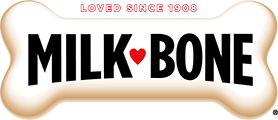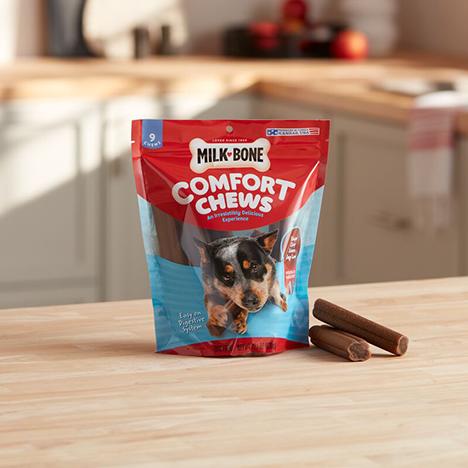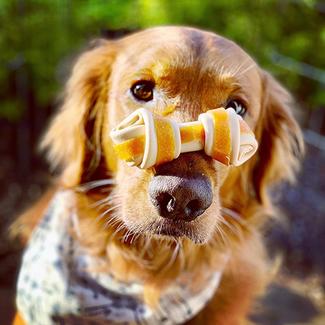Featured Posts

If your pup isn't feeling well, they might need some medicine. But how do you get your dog to take pills they might not want to take? Read our tips here.

Our animal nutritionist Dr. Donna Waltz reveals why dogs go nuts for a scoop of peanut butter (and possibly even jelly)!
Posts by Topic
Canine Assistants
View All
Find out more about the wonderful nonprofit Canine Assistants from Gary Arnold.

When you buy Milk-Bone® treats, you help us support life-saving, joy-spreading service dogs like these from Canine Assistants®, our non-profit partner. See their stories.

Jennifer Arnold explains the origin of the Georgia-based nonprofit Canine Assistants and its Bond-Based Approach Teaching principles.
Dental Care
View All
Want to know what to ask your vet prior to your dog's dental cleaning appointment? Here our expert lets us know!

Some dental chews are better than others. Our expert pet nutritionist gives advice on choosing the best dental chew for your dog.

Canine kisses are the best—if your dog’s breath is as fresh as a spring morning.
Care
View All
Going “off-leash” is a growing trend and a hotly debated topic in the pet-parent community. We weigh the pros and cons of living life unleashed.

Want to have more fun with your pet, but don't have the time? Squeeze in more love with these tips.

Dogs love to play outside, which can mean getting dirty. If your dog balks at the idea of a bath, check out these squeaky-clean tips for dog grooming at home.
Dog Facts
View All
Our animal nutritionist Dr. Donna Waltz reveals why dogs go nuts for a scoop of peanut butter (and possibly even jelly)!

Find out which dog breeds don’t shed. A must-read if you currently have dog hair on your clothes.

Discover the secrets behind common dog behavior (especially the things that drive you crazy!) and what you can do about it.
Celebrations
View All
You love your pet. National Love Your Pet Day is an occasion to celebrate that love! Here's how.

Get outside with your pooch this fall! Enjoy these fun activities to do with dogs (and each other!) all season long.

Give your dog a little extra something to love on February 14th with Valentine’s Day gifts for dogs. Learn how you can get their tails wagging with special treats, activities and more.
Behavior
View All
Our animal nutritionist Dr. Donna Waltz reveals why dogs go nuts for a scoop of peanut butter (and possibly even jelly)!

Discover the secrets behind common dog behavior (especially the things that drive you crazy!) and what you can do about it.
Health
View All
When your pup is sick, shower her with extra TLC. Here's how to care for your dog when she's not feeling her best.

If your pup isn't feeling well, they might need some medicine. But how do you get your dog to take pills they might not want to take? Read our tips here.

Whether we like it or not, we all know that as we age, things that were once easy become more difficult.
Horoscopes
View All
If an Aries dog chooses to adopt you, make sure you have a lot of energy. The first sign of the Zodiac, they are spirited and vivacious with an antic sense of humor.

A Taurus dog is inherently shy and has a great need for security. They don't like to ride in the car, hate to move and abhor loud noises and chaos of any kind. Some call these dogs lazy, but others prefer to say they are extra cuddly and are always up snuggles in their favorite sunny spot. If you have a Taurus pup, you likely already know how they seek out stability and thrive with a consistent routine. Try not to argue in front of your little Taurean and take more care on July 4th with your Taurus pooch than you would with other signs. Both thunderstorms and fireworks send them into a tizzy. Although very sweet, Taurus dogs are ruled by Venus and are known to be quite headstrong—not surprising considering this sign is also represented by the bull.

A Gemini dog is an excellent companion for owners who enjoy a lot of outdoor activity. Ruled by Mercury, these pups are intelligent and excitable; they require a big yard to race around in or long walks to burn off nervous energy. If you choose a Gemini pup, you should certainly have the space or some sort of plan to help them exercise. Some dogs can be a bit rambunctious and turn to naughty behavior if they aren’t given the opportunity to burn some energy off. They also have a very low boredom point and need constant changes in scenery, toys, activities, and food types. The more exotic the better – they are food adventurists.
Gemini dogs love trying new treats and discovering new flavors along the way. And, of course, your furry friend deserves only the best. There are two delicious Milk-Bone® treat options that are sure to satisfy your Gemini’s curiosity. The first is the new Milk-Bone® Comfort Chews made with USA- raised beef. These yummy treats are a great way to relax and distract your dog after a long walk or trip to the park. Or, for something a bit more innovative, try the Milk-Bone® GravyBones® Dog Biscuits. Whenever your Gemini dog sees this box you can expect some excited tag wags!
Halloween
View All
Treating your dog to a fun and safe Halloween doesn’t have to be tricky. Use these Halloween dog safety tips to enjoy the night without any unnecessary frights.

Follow our below steps to make sure you throw the perfect dog Halloween party this October!
Holiday
View All
Check out our DIY guides for Christmas dog decorations to deck the halls with bowwows of happiness to make your holiday with your dog merry and bright.

We’ve got five ideas to help you make the holidays with your dog that much more magical for your pooch.

Try these dog gift tutorials to make visions of Milk-Bone® treats dance in your pooch’s head and have a great holiday with your dog.
Valentine's Day
View All
Download these adorable Valentine's Day cards for your doggy valentine, courtesy of Milk-Bone.

Give your dog a little extra something to love on February 14th with Valentine’s Day gifts for dogs. Learn how you can get their tails wagging with special treats, activities and more.

Are you head-over-heels for your dog? Valentine’s Day is the perfect time to show it. From car rides to dog dates, you’ll find all sorts of ways to celebrate from Milk-Bone®.









